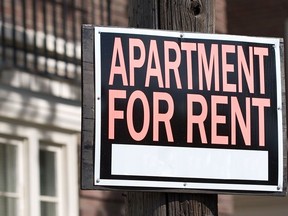The $5.5 million spent by the B.C. Rent Bank on loans, grants and administrative costs in 2023-24 will lead to $27.5 million in savings over the next three years

More than half of the estimated savings — $16.1 million — will benefit renters facing costs from rental increases, moving and storage, and lost possessions. Meanwhile, the government is expected to save $11.4 million because it won’t have to spend as much on emergency shelters, housing services, health care and child welfare, according to the report from the VanCity Community Foundation, which oversees the program.
“This study has shown us that investing in eviction prevention is not only the ‘good’ thing to do but is also the fiscally responsible thing to do,” Melissa Giles, managing director of B.C. Rent Bank, said in a statement.
Currently, there are about 685 applications received by local rent banks across B.C., Giles said in an email.
“Many renters are one emergency away from missing rent and facing eviction.”
A 2021 survey conducted by the B.C. Rent Bank found that 91 per cent of respondents said rent bank assistance helped keep them housed. Sixty-one per cent said the support likely kept them from ending up homeless.
In 2019 the province allocated $10 million to fund the B.C. Rent Bank. The loans are intended to be an alternative to high-interest lending institutions, like payday loan companies.
In January 2024, the province announced an additional $11 million in funding for the rent bank — $3.4 million provided in December 2023, a commitment for $3.1 million in 2024-25, and $4.5 million the following year.
About 35 per cent of the annual budgets of local rent banks come from other funding partners, such as municipalities, community grants, financial institutions and private donors, Giles said.
Giles said demand is growing. Last year, the rent bank program helped keep 2,500 renters in their homes and the value of loans issued grew by 50 per cent.
The average value of a loan in 2023-24 was $1,500. Loans make up about two-thirds of the financial support provided by the rent bank program. They can be used to cover rent, utilities and security deposits or first month’s rent on previously approved housing.
Successful recipients have up to three years to repay the interest-free loan. Roughly 70 per cent of loans have been repaid in that time frame.
Kieran Sabo, a renter from Abbotsford, said during a news conference in January 2024 that announced the additional $11 million in provincial funding that a loan he received through the rent bank kept him from losing his rental unit after he lost his job following a back injury at home.
“Much to my joy, it was handled very quickly, elegantly and efficiently,” said Sabo, who received the funds within 48 hours of reaching out. “I would tell anyone, if you feel like you’re struggling in any way — like most of us are these days — don’t hesitate to reach out for help.”
While the rent bank program may provide immediate, cost-effective assistance, it isn’t a silver bullet.
Roughly 85 per cent of recent evictions in B.C. were the result of the sale, demolition, or renovation of the property or the landlord wanting a unit for their own use, the study found.
Giles said the rent bank program is just one piece in what needs to be a multi-pronged approach to tackling the housing crisis.
“We need affordable housing, emergency shelters and transition homes for those already experiencing homelessness,” she said.
“Our focus is to keep people housed,” Giles said. “Evictions are as expensive as they are disruptive.”
With a file from Katie DeRosa